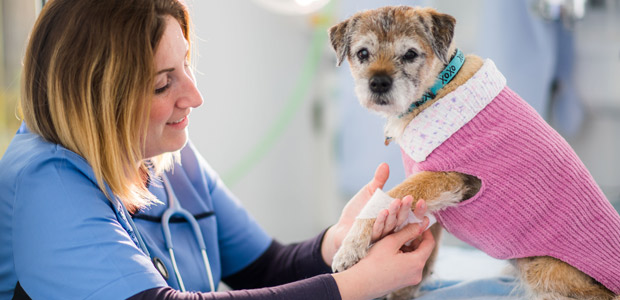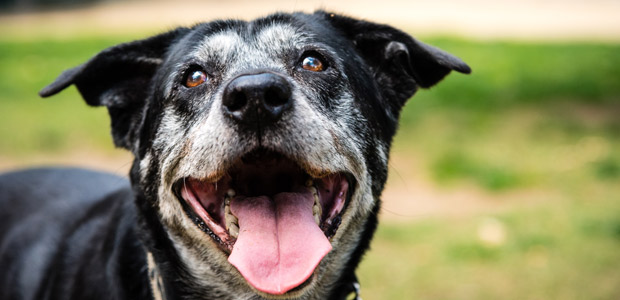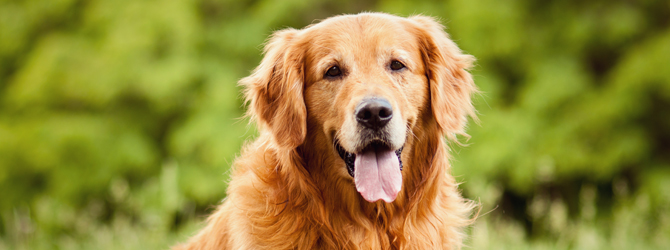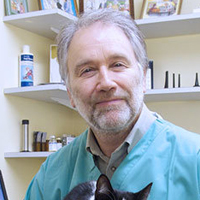Caring for an older dog: keeping senior dogs in good health
First Published: 23/08/2018
Last Updated: 30/10/2023
Did you know that dogs are considered to have reached full maturity between the age of seven and ten - depending on their breed?
Surprising, right? Especially as modern dogs are known to live to a ripe old age!
As they grow older, dogs will need a bit more TLC than their younger and more active counterparts.
Let’s take a look at the physical changes elderly dogs go through, the potential health problems to watch out for, and our best methods of keeping your senior dog healthy and comfortable.
What physical changes occur as a dog grows older?
Just like humans, older pets can start to ‘show their age’ once they reach their senior years. Here are some things you might spot:
- Your dog is less active than they used to be
- Their sense of smell and taste doesn’t seem as keen
- They begin to look a little chubby (as their metabolism slows)
- Their coat appears less glossy
- Smelly breath
- Eyesight and hearing isn’t what it was
- Changes in behaviour - including becoming more snappy
Are elderly dogs more prone to health problems?
As a dog reaches their mature years, their body slowly starts to deteriorate. This includes their internal organs and immune system, leaving them more prone to an array of conditions, including:
- Canine kidney disease (including renal dsease)
- Canine diabetes
- Cancer
- Thyroid disease
- Liver disease
- Prostate problems
- High blood pressure (hypertension)
- Gastrointestinal issues (stomach problems)
- Canine arthritis
Of course, elderly dogs aren’t GUARANTEED to develop any of the conditions above, they’re just put at a higher risk because of their advanced age.

What are the signs to watch out for?
Now that your dog is older, it’s important to be extra vigilant. The following symptoms could be evidence of the conditions listed above, you be sure to give your vet a call if you spot any of them:
- Drastic weight loss
- Increased thirst
- Lumps and bumps, which could be tumours
- Increased urination
- Diarrhoea and gastrointestinal issues
- Vomiting and sickness
- Increased aggression
- Loss or increase of appetite
- Lethargy
Routine health checks are more important than ever
Routine check-ups are important no matter how old your dog is but as they grow older, attending regular check-ups becomes even more important.
Your dog may show no symptoms and appear to be in great health, but many conditions can be symptomless in the beginning. Plus, the earlier your vet can spot a condition developing, the easier it’ll be to treat.
Likewise, now they’re older, it’s extra important for your dog never to miss out on routine treatments such as booster vaccines and flea, worm and tick treatment. If it’s been a while since you last visited the vet, get in touch!
How to make an old dog comfortable at home
Okay, so it’s important to keep your eyes open and to call your vet if you’re concerned. But what can you do to keep your dog comfortable during day-to-day life?
Keep their bedding downstairs, and make sure it’s nice and comfy.
Provide plenty of entertainment to keep your dog’s mind active. It doesn’t have to be rough play - a puzzle feeder will work brilliantly!
Keep them warm and dry - older dogs can’t regulate their body temperature as well, why not provide them with a few extra blankets?
Provide shade in the summer - store their bedding somewhere cool and well-ventilated, and keep fresh water close by.
Maintain their exercise in moderation - too much may be exhausting, too little won’t support their muscles and could cause weight gain.
Change their diet to match their exercise level - this will help keep their weight under control. We recommend discussing this with your vet first and remember, switch your dog’s diet gradually over a period of 10 days. I.e. nine parts old diet, one part new diet; eight parts old diet, two parts new diet etc.
Joint care for older dogs
Arthritis tends to affect dogs that are unfit and overweight - although not always! To reduce your dog’s chance of developing arthritis in old age, it’s useful to maintain their healthy weight.
Symptoms of arthritis are usually worse in cold, damp conditions. This is why it’s so important to make sure your dog stays nice and warm when they’re at home. Plenty of thick blankets will also make a comfortable surface for your dog to sleep on, putting less pressure on their joints.
Why not use a therapeutic product to soothe your dog’s joints?

Why do dogs get fatty tumours as they get older?
Fatty tumours, also known as lipomas, are simply another side-effect of ageing. A lipoma is a collection of fat cells, they usually grow as the dog ages. Overweight dogs are more prone to larger lipomas, and a lipoma may shrink as a dog loses weight.
Lipomas are usually harmless, but can cause trouble if they get too big. If you notice any swelling that grows in size, contact your vet right away. In some cases, treatment can involve surgically removing the tumour.
It’s also a good idea to check your dog’s coat regularly for lumps and bumps, and let your vet know if you spot anything suspicious.
Can older dogs get Parvo?
Unvaccinated dogs can contract Parvo (Canine Parvovirus) at any age, so it’s important to keep up your dog’s preventative vaccines throughout their life.
Parvo may be associated more commonly with puppies, but it can affect any dog whose immune system is weaker than average. Older dogs’ immune systems aren’t as effective as their younger counterparts, so keeping them vaccinated against Parvo and up to date with all their preventative treatments is very important.
Need more information?
For expert advice on senior dog care, get in touch with your local vet.
Find your nearest vet using our Find a Vet page, or speak to a vet online using Online Vets.


